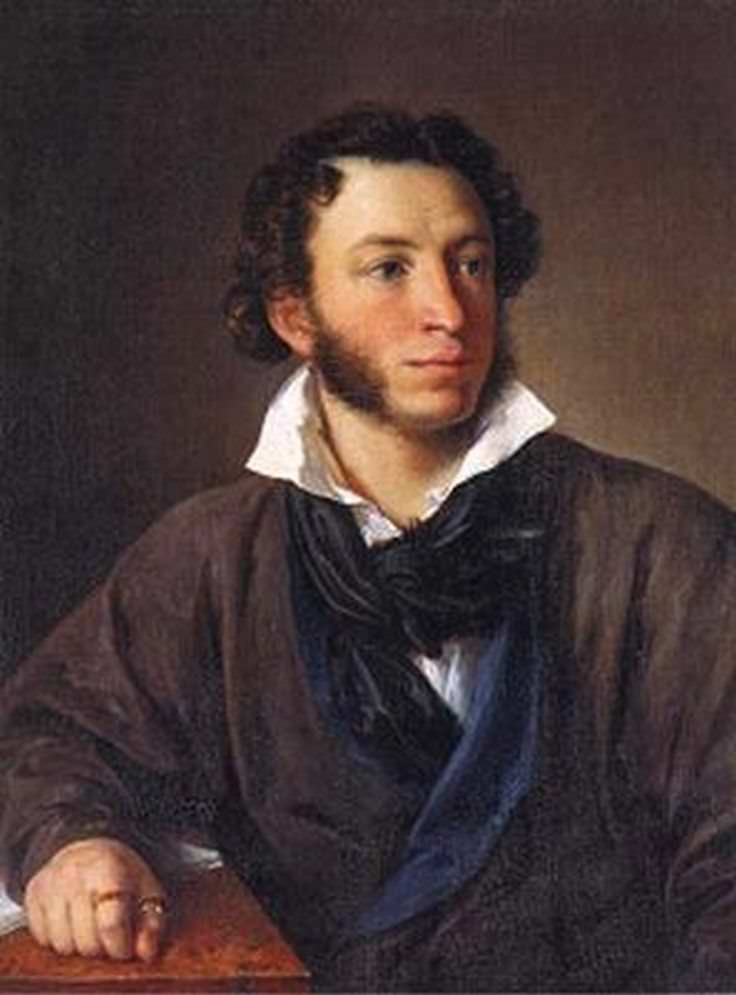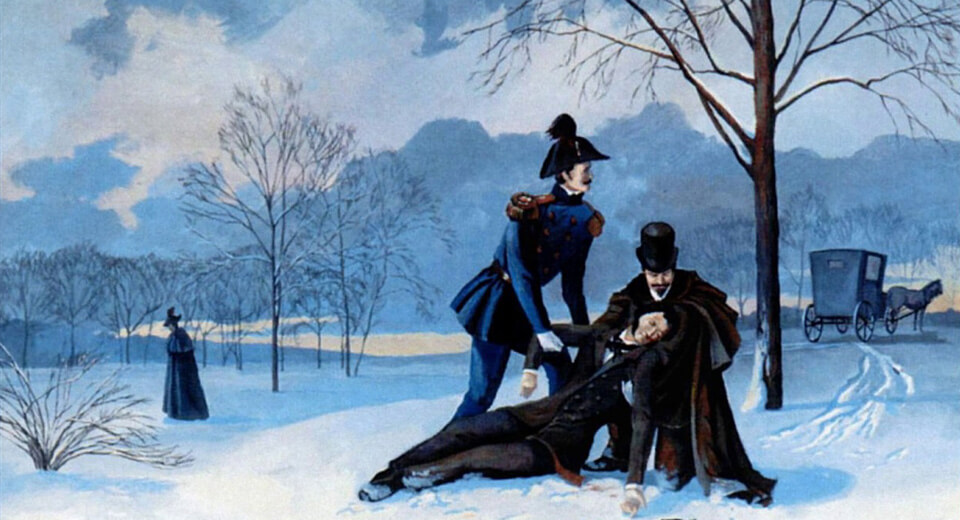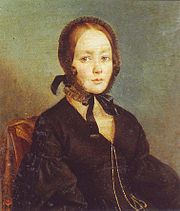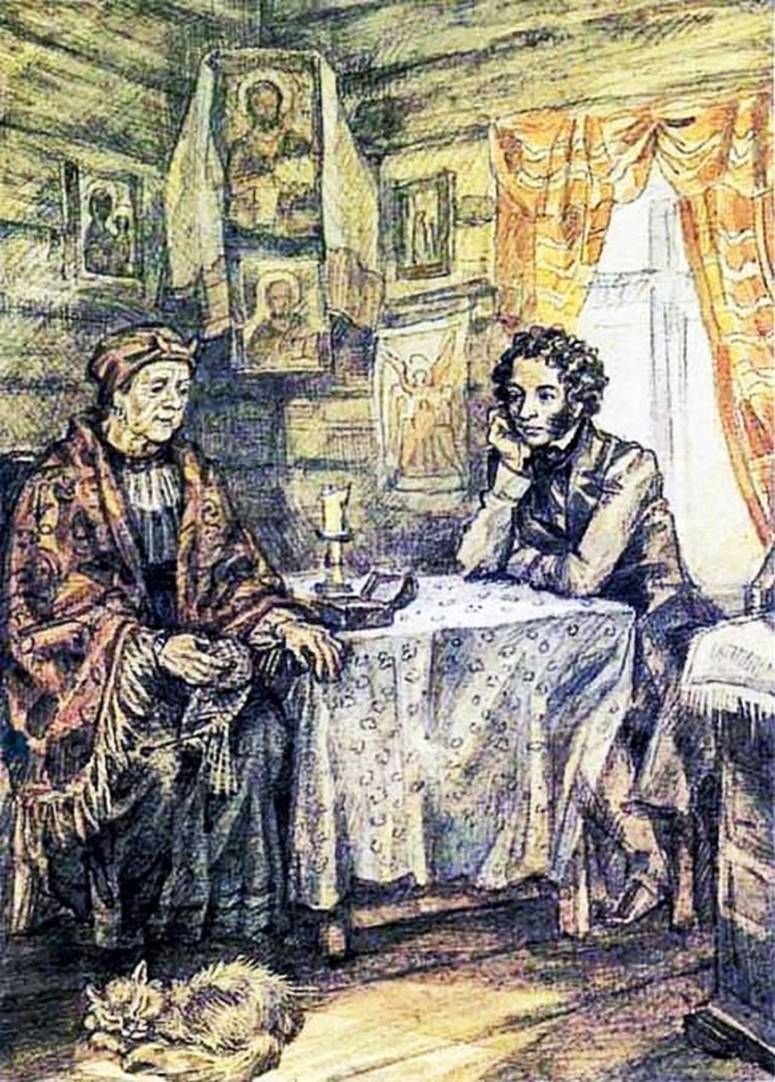
 |
|
Стихи Пушкина Pushkin (Alexander Sergeyevich Pushkin) is regarded by many as Russia’s greatest poet and the founder of modern Russian literature (Wikipedia). He was a prolific writer of poems, novels and plays. Tragically, his life was cut short at the age of thirty-eight by being on the losing end of a typically Russian duel. Somewhat ironically, one of his most prodigious works – the verse-written novel Eugene Onegin – featured a duel as a key dramatic turning point. Although its publication began in serialised form in 1825, its final version was published in 1837, the year Pushkin himself fell fatal victim to a duel. One might be tempted to think he wrote his own destiny. Be that as it may, the purpose of this page is to offer a very small taste of Pushkin the poet. As part of brushing up on my long-ago studied Russian, I have been re-introduced to Pushkin…in Russian. That had led me to tape a couple of his (very short) notable poems. In addition, for the first two poems listed below, I ended up producing my own translations into English after becoming frustrated at the ones on offer. I’m certainly no professional translator and struggle with an elementary knowledge of Russian; and am far from having any claim to expertise in Russian poetry or, for that matter, in English poetry. So I’ve probably made a hash of the translations and ended up with primary grade “poetry”. But I have tried to capture more of how I imagined Pushkin might have felt even if I’ve wandered a bit too far from his words; not to mention his rhyme and metre structures.
At This stage I’ve delved into only three poems: The first, named by Pushkin simply as “K****”. That’s a quaint way of not disclosing the identity of the person who was the object of his obsession and who inspired this now renown love poem. K is simply the Russian preposition that can be translated here as To or For. The second is named “For My Nanny” (Nya-nye). It’s a short heart-felt memory of the love and dedication of his nanny towards him.
The title is sometimes rendered in Russian and English as the first line of the poem. In English, it’s something along the lines of "I remember a wonderful moment." In the recitation, I kept the Russian for reasons explained below.
As to the "title" I was reluctant to use the English translation alluded to above after reading a few comments from Vladimir Nabokov - well-renown and justly so for both his own literary achievements and his translations between English and Russian (both ways); not least also for his novel and movie screenplay "Lolita". Nabokov lauded the deep meaning and poetic excellence of the opening line in Russian: "most exciting and soothing to the Russian ear." But derided the English rendition into "I remember a wonderful moment" as a "foolish and flat statement" that "no stretch of the imagination [could] persuade an English reader [to be] the perfect beginning of a perfect poem." He observed that the expression "a literal translation" is more or less nonsense citing that я помню (ya pom-new) is "a deeper and smoother plunge into the past than 'I remember'." ("The Art of Translation" by Vladimir Nabokov, New Republic, August 4, 1941) There are any number of English translations of the poem, some trying to be somewhat "literal" and others being more imaginative (and beautiful). I took the arrogant and presumptuous liberty of creating a translation that I felt more comfortable with in terms of trying to capture Pushkin's feelings. I readily confess that in doing so (if, indeed, I have succeeded or not), I have wandered at times a long way from his words and no doubt also trashed poetic etiquettes of iambic whateverameter and rhyme structures. In the depths of sadness with no hope, Years of turmoil laid bare my plans, Far away in my isolation and fears, From the dark my soul awoke, Enraptured my heart trembled in awe, You can find a PDF with both Russian and English versions here.
According to Wikipedia: "Pushkin was entrusted to nursemaids and French tutors, and mostly spoke French until the age of ten. He became acquainted with the Russian language through communication with household serfs and his nanny, Arina Rodionovna, whom he loved dearly and was more attached to than to his own mother." The poem was written in 1926 during the time Pushkin was exiled at his mother’s rural estate. It’s likely that being at the estate, which was his childhood home, brought back memories of the time spent with his nanny.
In my harsh childhood of a life forlorn Your loving care for me was warm.
For days on end in the forest so bleak You’re left alone rife with concern Your eyes alert - for me they seek You wait in pain for my safe return.
By the window with your wool you sit You look beyond the gates firmly closed Your ageing hands can no longer knit You see nothing but a long and empty road.
You fret with anguish at your plight It’s me that makes you feel the pain so tight.
That’s how it was for you. I Loved You In this case, I have added the words in both Russian and a translation into English as subtitles to each pair of lines. A Recitation of the Poem
I loved you; and perhaps I love you still,
(Translation by Babette Deutsch)
|

 I have included the English versions in the recitations and in the notes on You Tube (see links below). They are also included in the sections below on the poems
I have included the English versions in the recitations and in the notes on You Tube (see links below). They are also included in the sections below on the poems ide-stepping all that for now, the default scenario is that in 1819 in the social circles of St Petersburg, Pushkin met and was besotted by one, Anna Kern, young, beautiful but married. Thoughts of her continued to torment him in the following years, at least before he was sent into exile in 1824. Not exactly Far East Gulag-type exile but "far west" family estate-type exile (near Pskov close to the border with Latvia). None the less for Pushkin it was oppressively confining in depriving him of his social activism and especially his literary pursuits. This was the nadir of his despondency. Then, seemingly fortuitously, Anna was visiting a neighbouring estate in 1825 and they met up again. This was some six years after their first meeting; and there would seemed to have been a tad more to this rendezvous than the experience of the first meeting. The various stages of Pushkin's emotional responses to his life and love can be traced through the six stanzas of the poem.
ide-stepping all that for now, the default scenario is that in 1819 in the social circles of St Petersburg, Pushkin met and was besotted by one, Anna Kern, young, beautiful but married. Thoughts of her continued to torment him in the following years, at least before he was sent into exile in 1824. Not exactly Far East Gulag-type exile but "far west" family estate-type exile (near Pskov close to the border with Latvia). None the less for Pushkin it was oppressively confining in depriving him of his social activism and especially his literary pursuits. This was the nadir of his despondency. Then, seemingly fortuitously, Anna was visiting a neighbouring estate in 1825 and they met up again. This was some six years after their first meeting; and there would seemed to have been a tad more to this rendezvous than the experience of the first meeting. The various stages of Pushkin's emotional responses to his life and love can be traced through the six stanzas of the poem. 
